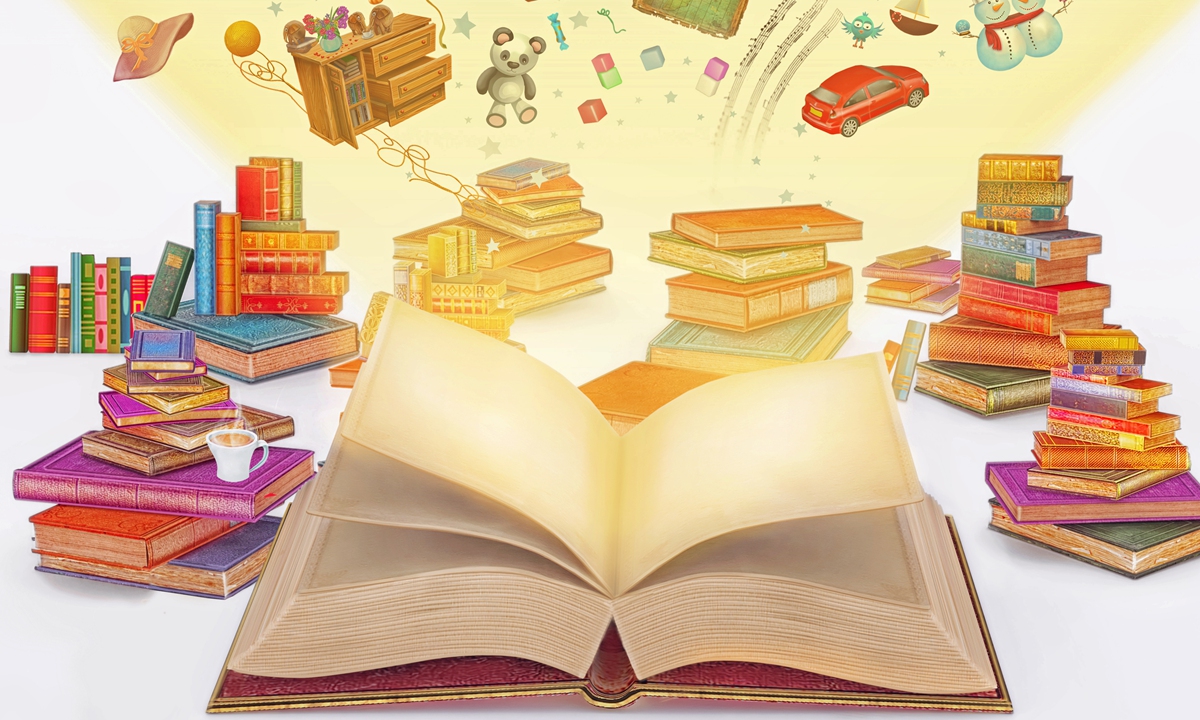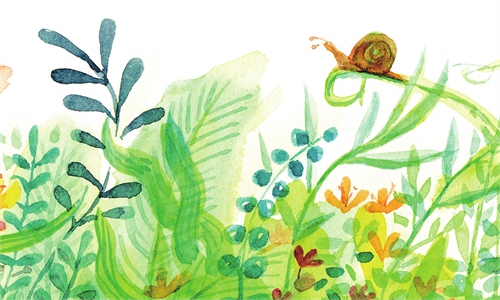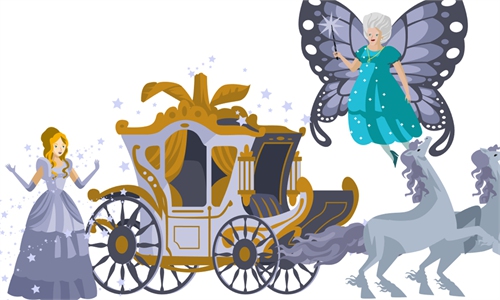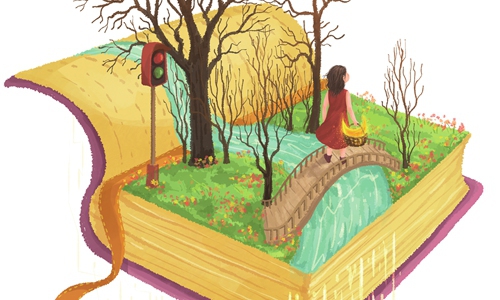ARTS / CULTURE & LEISURE
Good Maverick
How reading helped me with deep thinking in the information age
Editor's Note:
"Read ten thousand books, and your pen will be guided as if by the gods" is an ancient Chinese idiom that can be seen in students' textbooks. China's Ministry of Education has published an action plan to further promote reading among students across the nation. With new and diverse book recommendations, the reading scene is expected to be revived not only at schools, but also across society. To contribute to this endeavor, the Global Times launched "My Reading Life" essay contest for middle school students.
Please pick up a pen and share your stories with us at reading@globaltimes.com.cn
Participants will be rewarded once the article has been selected.

While the convenience of this constant connectivity is undeniable, it has also given rise to a paradox: In our quest for instant access to information, we risk losing the capacity for deep and reflective thought. This became increasingly apparent to me as I found myself bombarded by the sheer volume of content I was consuming, unable to engage with it meaningfully. It was only when I recovered the habit of reading that I began to regain a sense of clarity and control over my thoughts.
New discovery
The turning point for me came when I picked up Sapiens: A Brief History of Humankind by Yuval Noah Harari.
Initially, I was not particularly enthused. The book appeared to be a monumental undertaking, especially given my tendency to consume information in short bursts - whether it be through news headlines, social media updates, or podcasts.
Harari's work, by contrast, demanded sustained attention and intellectual effort. His examination of human history from the rise of early civilizations to the complexities of the modern world presented a challenge to the quick-fix nature of contemporary media.
Initially, it felt sluggish and even unwieldy, but as I delved deeper, I grew to value Harari's insights. His analysis of the growth of human societies and the evolution of cultural, political, and economic systems made me rethink how we interact with information today. It highlighted the harm of consuming content in quick and fragmented snippets without pausing to critically reflect on the world.
This awareness signaled the start of a more profound journey. In an era of overwhelming information, it became clear that digital media's immediacy is undermining our ability to think critically. Social media platforms, for instance, are built to grab our attention with striking headlines and emotionally charged content. This fosters a culture of instant judgments, where issues are reduced to oversimplifications, and depth is traded for brevity. The system prioritizes speed over substance, rewarding those who provoke quick reactions rather than promoting thoughtful analysis.
Determined to break free from this cycle, I began to seek out books that would encourage me to slow down and engage more deeply with the material. One such book was Gabriel García Márquez's One Hundred Years of Solitude. Márquez's narrative is rich with magical realism, weaving together the lives of multiple generations within a single family.
What captivated me wasn't just the story itself, but how it compelled me to pause and think. Every page invited reflection, and each character's journey encouraged introspection. It was a refreshing contrast to the fast-paced consumption of modern media, offering the time and space to ponder profound aspects of human existence like love, power, and the passage of time. Through Márquez's masterful storytelling, I came to appreciate that literature more than any other medium as it has the unique ability to foster a richer, more nuanced understanding of the world.
As I read further, I became increasingly aware of how deeply books influence our capacity for critical and independent thinking. Unlike the fleeting nature of digital content, which often prompts reactive rather than reflective responses, books encourage deliberate contemplation. They require sustained engagement with ideas, offering the time necessary to absorb and process information. This mindful interaction fosters the development of comprehensive perspectives, rather than fragmented views shaped by incomplete or sensationalized content.
Books, at their core, offer an escape from the relentless pace of daily life, inviting us to consider the bigger picture. They serve as a framework for exploring complex topics — social, political, or philosophical — and equip us with the tools to critically evaluate the world around us. In an era dominated by a flood of news, often shallow or skewed to serve specific agendas, reading fosters a more thoughtful approach to consuming information. It emphasizes the importance of context, encourages us to question assumptions, and underscores the need to examine diverse perspectives before reaching conclusions.
This is particularly evident in historical and philosophical works. Consider Aristotle's writings, for instance — his reflections on ethics and the nature of a good life continue to hold relevance even after more than 2,000 years. These timeless ideas offer profound insights into the intricacies of human behavior. Engaging with such texts compels us to face challenging questions, prompting introspection about our values and how we choose to live. It is this confrontation with complex ideas and the pursuit of deeper truths that makes reading an indispensable tool for both intellectual growth and personal development.
Deeper connection
In contrast, the rapid, often shallow consumption of information through digital media does not lend itself to such engagement. While social media offers the convenience of instant updates, it also encourages us to engage with information in a fragmented way. We may skim through headlines without pausing to consider the full context, or we may react to content based on emotional appeal rather than reasoned analysis. This is not to suggest that digital media has no value as it can inform, entertain, and connect us to the wider world, but its nature often promotes a style of thinking that is reactionary rather than reflective.
In reading, we find a counterbalance to this trend. Books provide the time and space needed for critical thought, offering insights that help us navigate the complexities of the world with a more informed, thoughtful approach. Whether it is through novels that offer rich emotional and intellectual landscapes, or non-fiction works that deepen our understanding of history and society, reading allows us to cultivate the skills necessary for independent thought.
In conclusion, reading has played a transformative role in reshaping my approach to information in the modern world. In an age where we are bombarded with information, it is all too easy to become disengaged. However, books offer us the time and space to reflect, consider, and think deeply. Through reading, I have learned to slow down, question assumptions, and engage more meaningfully with the world around me. In doing so, I have discovered that the true value of information lies not in its abundance, but in our ability to understand, critique, and apply it wisely.
The author is a student at Shenyang Railway Experiment High School
"Read ten thousand books, and your pen will be guided as if by the gods" is an ancient Chinese idiom that can be seen in students' textbooks. China's Ministry of Education has published an action plan to further promote reading among students across the nation. With new and diverse book recommendations, the reading scene is expected to be revived not only at schools, but also across society. To contribute to this endeavor, the Global Times launched "My Reading Life" essay contest for middle school students.
Please pick up a pen and share your stories with us at reading@globaltimes.com.cn
Participants will be rewarded once the article has been selected.

Photo: IC
In today's rapidly evolving world, information is more accessible than at any point in history. With the advent of digital technology, particularly smartphones and the internet, we are perpetually connected to a global network that offers a continuous flow of data, from breaking news to trending social media posts.While the convenience of this constant connectivity is undeniable, it has also given rise to a paradox: In our quest for instant access to information, we risk losing the capacity for deep and reflective thought. This became increasingly apparent to me as I found myself bombarded by the sheer volume of content I was consuming, unable to engage with it meaningfully. It was only when I recovered the habit of reading that I began to regain a sense of clarity and control over my thoughts.
New discovery
The turning point for me came when I picked up Sapiens: A Brief History of Humankind by Yuval Noah Harari.
Initially, I was not particularly enthused. The book appeared to be a monumental undertaking, especially given my tendency to consume information in short bursts - whether it be through news headlines, social media updates, or podcasts.
Harari's work, by contrast, demanded sustained attention and intellectual effort. His examination of human history from the rise of early civilizations to the complexities of the modern world presented a challenge to the quick-fix nature of contemporary media.
Initially, it felt sluggish and even unwieldy, but as I delved deeper, I grew to value Harari's insights. His analysis of the growth of human societies and the evolution of cultural, political, and economic systems made me rethink how we interact with information today. It highlighted the harm of consuming content in quick and fragmented snippets without pausing to critically reflect on the world.
This awareness signaled the start of a more profound journey. In an era of overwhelming information, it became clear that digital media's immediacy is undermining our ability to think critically. Social media platforms, for instance, are built to grab our attention with striking headlines and emotionally charged content. This fosters a culture of instant judgments, where issues are reduced to oversimplifications, and depth is traded for brevity. The system prioritizes speed over substance, rewarding those who provoke quick reactions rather than promoting thoughtful analysis.
Determined to break free from this cycle, I began to seek out books that would encourage me to slow down and engage more deeply with the material. One such book was Gabriel García Márquez's One Hundred Years of Solitude. Márquez's narrative is rich with magical realism, weaving together the lives of multiple generations within a single family.
What captivated me wasn't just the story itself, but how it compelled me to pause and think. Every page invited reflection, and each character's journey encouraged introspection. It was a refreshing contrast to the fast-paced consumption of modern media, offering the time and space to ponder profound aspects of human existence like love, power, and the passage of time. Through Márquez's masterful storytelling, I came to appreciate that literature more than any other medium as it has the unique ability to foster a richer, more nuanced understanding of the world.
As I read further, I became increasingly aware of how deeply books influence our capacity for critical and independent thinking. Unlike the fleeting nature of digital content, which often prompts reactive rather than reflective responses, books encourage deliberate contemplation. They require sustained engagement with ideas, offering the time necessary to absorb and process information. This mindful interaction fosters the development of comprehensive perspectives, rather than fragmented views shaped by incomplete or sensationalized content.
Books, at their core, offer an escape from the relentless pace of daily life, inviting us to consider the bigger picture. They serve as a framework for exploring complex topics — social, political, or philosophical — and equip us with the tools to critically evaluate the world around us. In an era dominated by a flood of news, often shallow or skewed to serve specific agendas, reading fosters a more thoughtful approach to consuming information. It emphasizes the importance of context, encourages us to question assumptions, and underscores the need to examine diverse perspectives before reaching conclusions.
This is particularly evident in historical and philosophical works. Consider Aristotle's writings, for instance — his reflections on ethics and the nature of a good life continue to hold relevance even after more than 2,000 years. These timeless ideas offer profound insights into the intricacies of human behavior. Engaging with such texts compels us to face challenging questions, prompting introspection about our values and how we choose to live. It is this confrontation with complex ideas and the pursuit of deeper truths that makes reading an indispensable tool for both intellectual growth and personal development.
Deeper connection
In contrast, the rapid, often shallow consumption of information through digital media does not lend itself to such engagement. While social media offers the convenience of instant updates, it also encourages us to engage with information in a fragmented way. We may skim through headlines without pausing to consider the full context, or we may react to content based on emotional appeal rather than reasoned analysis. This is not to suggest that digital media has no value as it can inform, entertain, and connect us to the wider world, but its nature often promotes a style of thinking that is reactionary rather than reflective.
In reading, we find a counterbalance to this trend. Books provide the time and space needed for critical thought, offering insights that help us navigate the complexities of the world with a more informed, thoughtful approach. Whether it is through novels that offer rich emotional and intellectual landscapes, or non-fiction works that deepen our understanding of history and society, reading allows us to cultivate the skills necessary for independent thought.
In conclusion, reading has played a transformative role in reshaping my approach to information in the modern world. In an age where we are bombarded with information, it is all too easy to become disengaged. However, books offer us the time and space to reflect, consider, and think deeply. Through reading, I have learned to slow down, question assumptions, and engage more meaningfully with the world around me. In doing so, I have discovered that the true value of information lies not in its abundance, but in our ability to understand, critique, and apply it wisely.
The author is a student at Shenyang Railway Experiment High School



